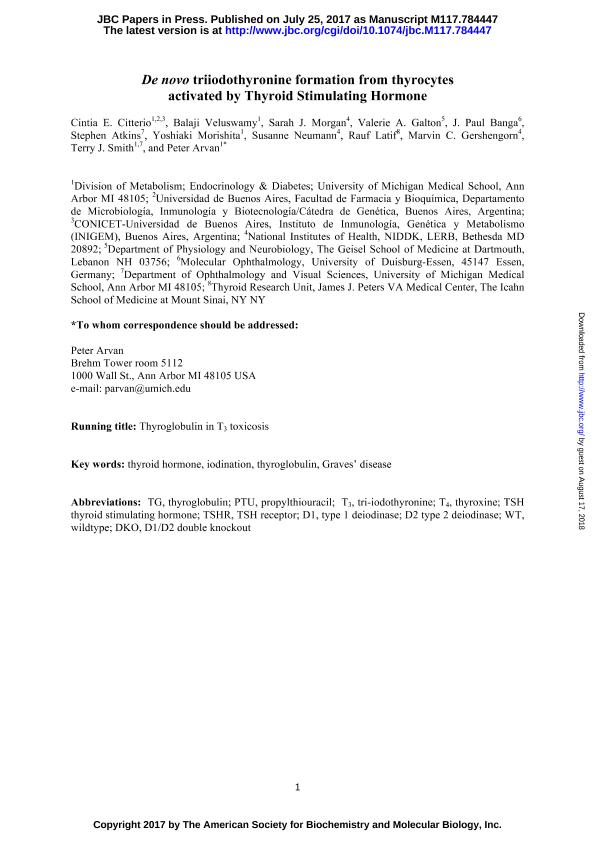Artículo
De novo triiodothyronine formation from thyrocytes activated by Thyroid-stimulating hormone
Citterio, Cintia Eliana ; Veluswamy, Balaji; Morgan, Sarah J.; Galton, Valerie A.; Banga, J. Paul; Atkins, Stephen; Morishita, Yoshiaki; Neumann, Susanne; Latif, Rauf; Gershengorn, Marvin; Smith, Terry J.; Arvan, Peter
; Veluswamy, Balaji; Morgan, Sarah J.; Galton, Valerie A.; Banga, J. Paul; Atkins, Stephen; Morishita, Yoshiaki; Neumann, Susanne; Latif, Rauf; Gershengorn, Marvin; Smith, Terry J.; Arvan, Peter
 ; Veluswamy, Balaji; Morgan, Sarah J.; Galton, Valerie A.; Banga, J. Paul; Atkins, Stephen; Morishita, Yoshiaki; Neumann, Susanne; Latif, Rauf; Gershengorn, Marvin; Smith, Terry J.; Arvan, Peter
; Veluswamy, Balaji; Morgan, Sarah J.; Galton, Valerie A.; Banga, J. Paul; Atkins, Stephen; Morishita, Yoshiaki; Neumann, Susanne; Latif, Rauf; Gershengorn, Marvin; Smith, Terry J.; Arvan, Peter
Fecha de publicación:
07/2017
Editorial:
American Society for Biochemistry and Molecular Biology
Revista:
Journal of Biological Chemistry (online)
ISSN:
0021-9258
Idioma:
Inglés
Tipo de recurso:
Artículo publicado
Clasificación temática:
Resumen
The thyroid gland secretes primarily tetraiodothyronine (T4), and some triiodothyronine (T3). Under normal physiological circumstances, only one-fifth of circulating T3 is directly released by the thyroid, but in states of hyperactivation of thyroid-stimulating hormone receptors (TSHRs), patients develop a syndrome of relative T3 toxicosis. Thyroidal T4 production results from iodination of thyroglobulin (TG) at residues Tyr5 and Tyr130, whereas thyroidal T3 production may originate in several different ways. In this study, the data demonstrate that within the carboxyl-terminal portion of mouse TG, T3 is formed de novo independently of deiodination from T4. We found that upon iodination in vitro, de novo T3 formation in TG was decreased in mice lacking TSHRs. Conversely, de novo T3 that can be formed upon iodination of TG secreted from PCCL3 (rat thyrocyte) cells was augmented from cells previously exposed to increased TSH, a TSHR agonist, a cAMP analog, or a TSHR-stimulating antibody. We present data suggesting that TSH-stimulated TG phosphorylation contributes to enhanced de novo T3 formation. These effects were reversed within a few days after removal of the hyperstimulating conditions. Indeed, direct exposure of PCCL3 cells to human serum from two patients with Graves’ disease, but not control sera, led to secretion of TG with an increased intrinsic ability to form T3 upon in vitro iodination. Furthermore, TG secreted from human thyrocyte cultures hyperstimulated with TSH also showed an increased intrinsic ability to form T3. Our data support the hypothesis that TG processing in the secretory pathway of TSHR-hyperstimulated thyrocytes alters the structure of the iodination substrate in a way that enhances de novo T3 formation, contributing to the relative T3 toxicosis of Graves’ disease.
Archivos asociados
Licencia
Identificadores
Colecciones
Articulos(INIGEM)
Articulos de INSTITUTO DE INMUNOLOGIA, GENETICA Y METABOLISMO
Articulos de INSTITUTO DE INMUNOLOGIA, GENETICA Y METABOLISMO
Citación
Citterio, Cintia Eliana; Veluswamy, Balaji; Morgan, Sarah J.; Galton, Valerie A.; Banga, J. Paul; et al.; De novo triiodothyronine formation from thyrocytes activated by Thyroid-stimulating hormone; American Society for Biochemistry and Molecular Biology; Journal of Biological Chemistry (online); 292; 37; 7-2017; 15434-15444
Compartir
Altmétricas



